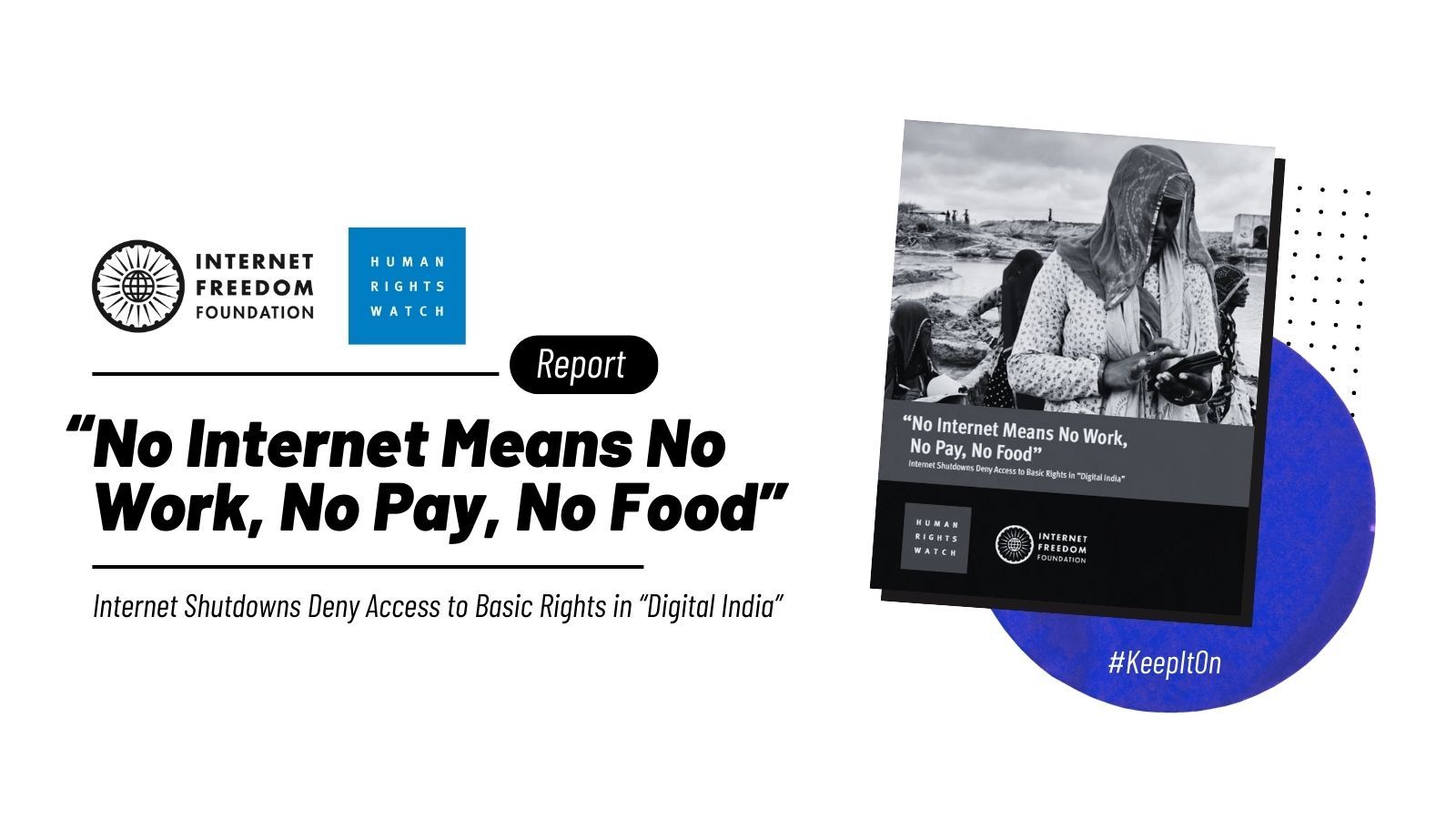
Tl;dr
On June 14th, 2023, IFF and Human Rights Watch (HRW) published a Report titled “No Internet Means No Work, No Pay, No Food - Internet Shutdowns Deny Access to Basic Rights in “Digital India”. The Report documents how arbitrary internet shutdowns in India have disproportionately hurt impoverished communities that depend on the government’s social protection measures for food and livelihood. This is because of Digital India’s insistence on authenticating the identities of beneficiaries, which simply cannot happen when the internet is suspended.
Background
Since 2018, India has suspended internet services more than any other country. In this period, the Government of India has also shifted to using online modes to deliver key public services such as ration under the National Food Security Act, 2013 and wages under the National Rural Employment Guarantee Act, 2005 (NREGA). Considering these developments, IFF collaborated with HRW to examine how shutdowns affect those dependent on the government's basic amenities. We have documented our findings in a report titled “No Internet Means No Work, No Pay, No Food - Internet Shutdowns Deny Access to Basic Rights in “Digital India”, which was released at a launch event on June 14, 2023. The report is based on nearly 70 interviews IFF and HRW conducted, including with those directly affected by internet shutdowns in several locations, including in Jammu and Kashmir, Rajasthan, Haryana, Jharkhand, Assam, Manipur, and Meghalaya. The report also contains a comprehensive list of every internet shutdown since the decision of the Supreme Court in Anuradha Bhasin v. Union of India. This list is based on the right to information requests that IFF filed in 2021 and 2022.
Summary of the report
The 82-page report finds that internet shutdowns impair essential activities and adversely affect economic, social and cultural rights guaranteed under the law. While previous studies on the impact of shutdowns have examined the adverse effect on freedom of speech, the insidious manner in which shutdowns prevent access to essential services has not been studied in detail yet.
The report documents how, since 2015, the Government of India has been aggressively pushing its ‘Digital India’ program. Here, to aggressively digitise governmental services, the Union Government has consciously decided not to permit beneficiaries to access entitlements using any offline mode. Directly as a result of this inflexible digitisation, IFF and HRW found that the most marginalised are left without necessities during shutdowns. Under the National Food Security Act of 2013, the poorest of the poor households are entitled to 35 kg of subsidised food grains from ration shops. In ‘Digital India’, they cannot avail food grains if their identity is not authenticated using a machine which relies on mobile internet. Thus, the most vulnerable are left without food when the internet is suspended.
Similarly, under NREGA, households are guaranteed 100 days of employment. Depending on the state, workers earn a daily wage ranging from 204 rupees (US$2.47) to 333 rupees (US$4.02). But Digital India insists that wages should only be paid to the workers if their attendance is recorded on the National Mobile Monitoring Software, which relies on the internet. This insistence on digitising NREGA has adversely affected many workers, who are not paid, not only when the internet is suspended but also when the mobile network is unavailable. Hundreds of workers have been protesting in Delhi for the past couple of months to bring this issue to the government's attention, which insists that Digital India is working perfectly.
Numbers and non-compliance of Anuradha Bhasin
Beyond documenting these material harms of internet shutdowns, the Report also examines the law which permits the executive to unilaterally suspend internet services without any oversight. As such, the report notes, that the Supreme Court’s directions in Anuradha Bhasin that - a) internet shutdown should only be suspended in ‘unavoidable’ situations and that b) shutdowns orders should be published, are continuously ignored. The report demonstrates this by listing the 127 instances of internet shutdowns in the three years between the Supreme Court’s decision in Anuradha Bhasin v. Union of India and December 31, 2022. Out of 28 Indian states, 18 states shut down the internet at least once during this period, and 11 of them did not publish shutdowns orders. They suspended the internet 54 times to prevent or in response to protests, 37 to prevent cheating in school examinations or in exams for government jobs, 18 in response to communal violence, and 18 for other law and order concerns.
Looking forward
We hope that the report, itself and along with other existing work on shutdowns contribute to advocacy against arbitrary suspension of internet services. The report's key is that the Union Government should revise the legal framework to require bureaucrats to obtain judicial approval for each shutdown order. It also recommends ensuring access to social security programmes under the NREGA and Food Security Act, irrespective of internet availability. These recommendations should be considered immediately to protect the most vulnerable from shutdowns, which continue to be imposed more often in India than elsewhere.
We are grateful to everyone who assisted us with the report.
Important Documents
1. HRW and IFF’s report titled “No Internet Means No Work, No Pay, No Food - Internet Shutdowns Deny Access to Basic Rights in “Digital India” (link)
2. Launch event (link)
